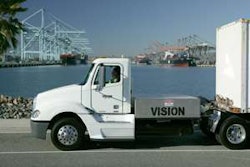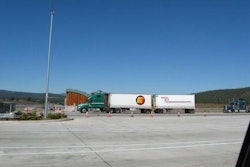UPS on Tuesday, April 6, announced its fleet of alternative-fuel vehicles had expanded with the deployment of 200 next-generation hybrid-electric delivery trucks in eight U.S. cities. The new HEVs join roughly 20,000 low-emissions and alternative-fuel vehicles already in use and have been deployed in Washington, D.C.; Austin, Texas; Louisville, Ky.; Long Island, N.Y.; Houston, Philadelphia, Chicago and Minneapolis. Before this latest deployment, UPS was operating 50 hybrid electrics in Atlanta, Dallas, Houston and Phoenix.
“We’re proud of this large HEV deployment to major cities in the United States,” says Bob Stoffel, UPS senior vice president of supply chain, strategy, engineering and sustainability. “This technology, where properly used, can yield a 35 percent fuel savings, the equivalent of 100 conventional UPS delivery vehicles.”
The 200 new HEV delivery trucks are expected to reduce fuel consumption by roughly 176,000 gallons over the course of a year compared to an equivalent number of traditional diesel trucks. The hybrids also should reduce by 1,786 metric tons the amount of CO2 gases released annually into the atmosphere.
The HEV fleet features two different-size vehicles from Workhorse Custom Chassis and Freightliner Custom Chassis Corp. and a hybrid power system from Eaton Corp. The external bodies of the UPS trucks are identical to the company’s other signature brown trucks, although they feature additional labeling identifying them as hybrid electrics. The trucks use lithium-ion batteries, which offer a faster recharging capability and last longer than previous-generation HEV batteries. Additionally, these vehicles are much quieter than conventional UPS trucks and feature keyless entry.
Since 2000, the company’s alternative fuel fleet – a diverse one with multiple technologies, including compressed natural gas, liquefied natural gas, propane, electricity and hydraulic-hybrid technology – has traveled more than 165 million miles. While continuing to develop its alternative fuel fleet – UPS has invested more than $15 million in the effort – the company also has purchased and is operating more than 20,000 low-emissions conventional vehicles that have regular gas- and diesel-powered engines but employ the latest technology and manufacturing techniques to reduce emissions as much as possible.
“The wide variety of technologies in our green fleet is indicative of UPS’s ‘rolling laboratory’ philosophy to energy efficiency and reduced fuel consumption,” Stoffel says. “Our goal is to reduce dependence on fossil fuels, but there is no silver-bullet technology to achieve this. This dependence will rely on a multimodal approach.”











